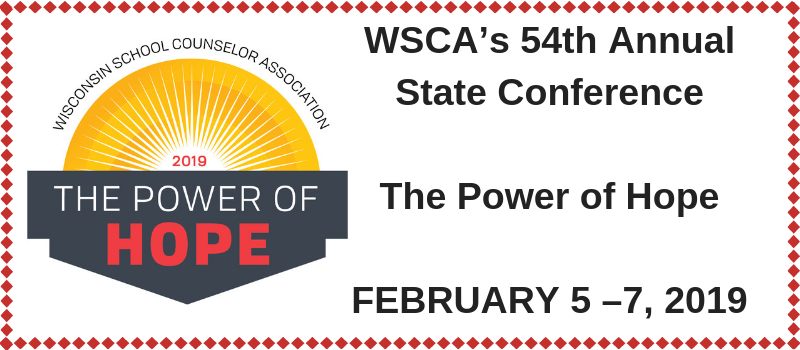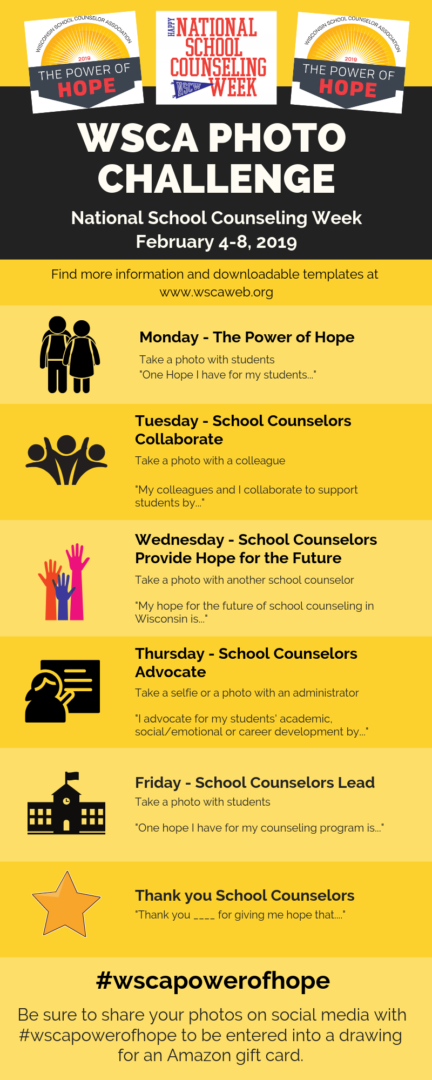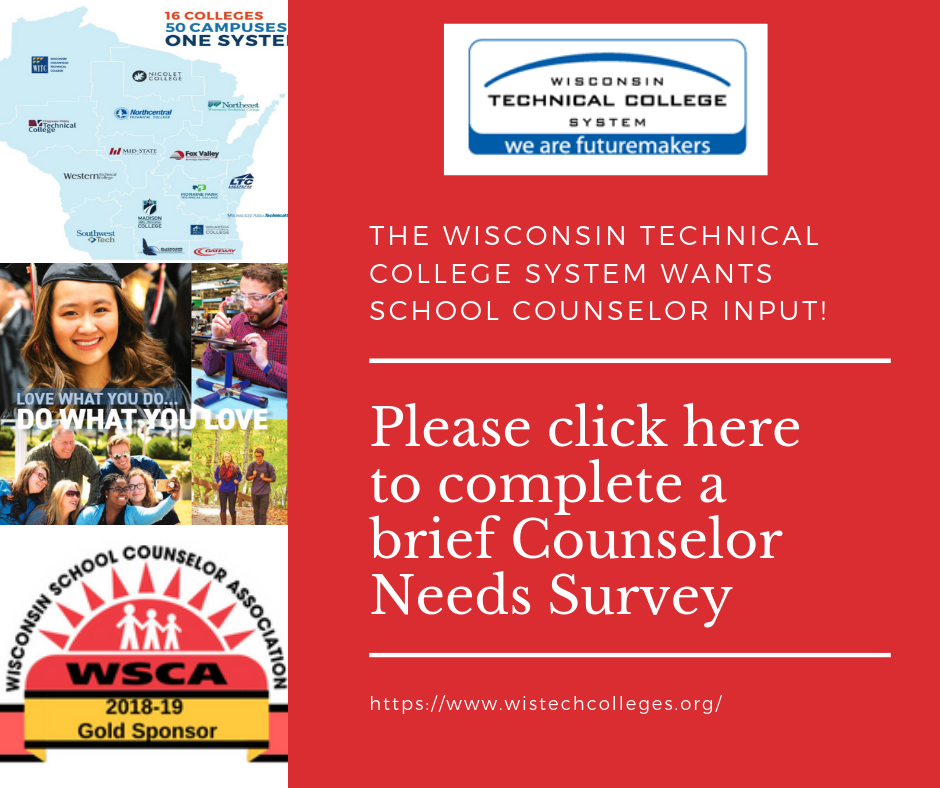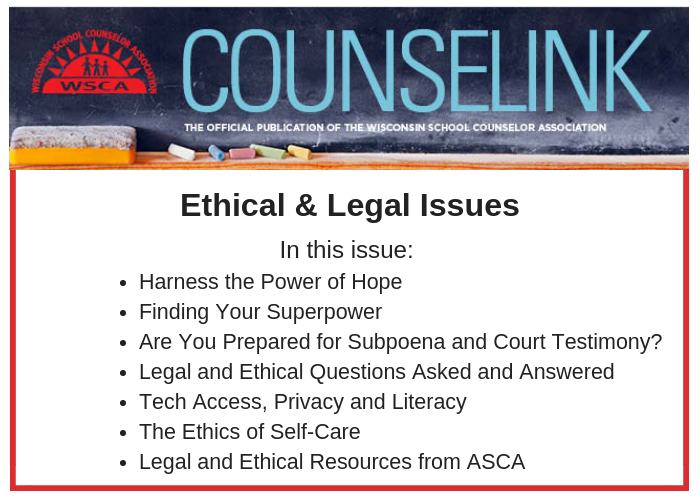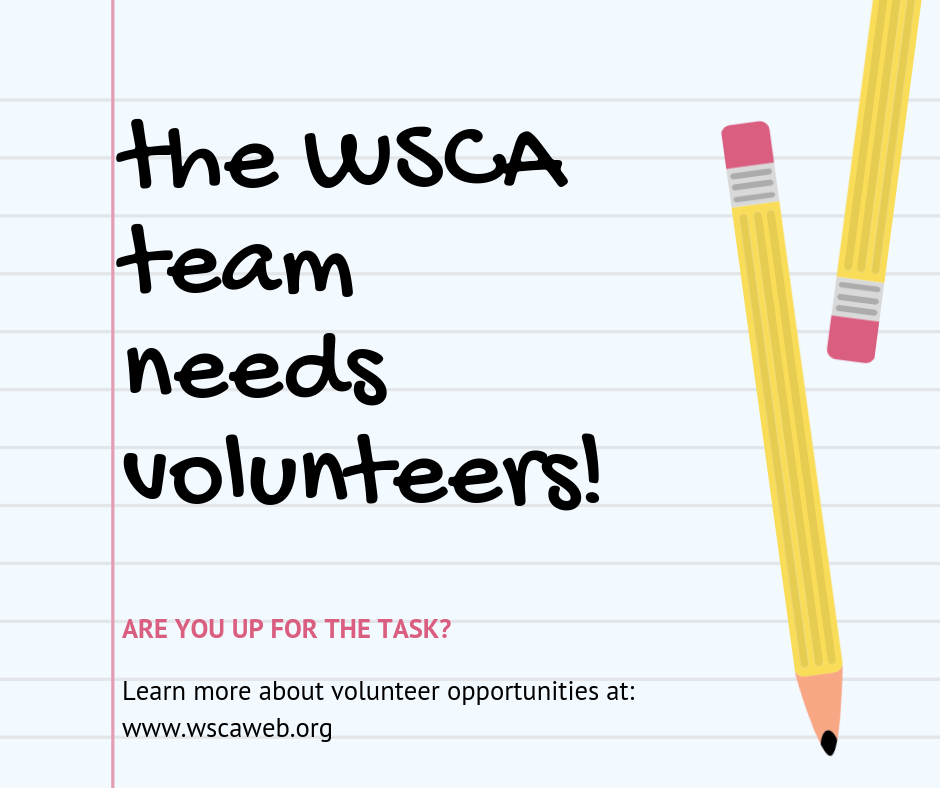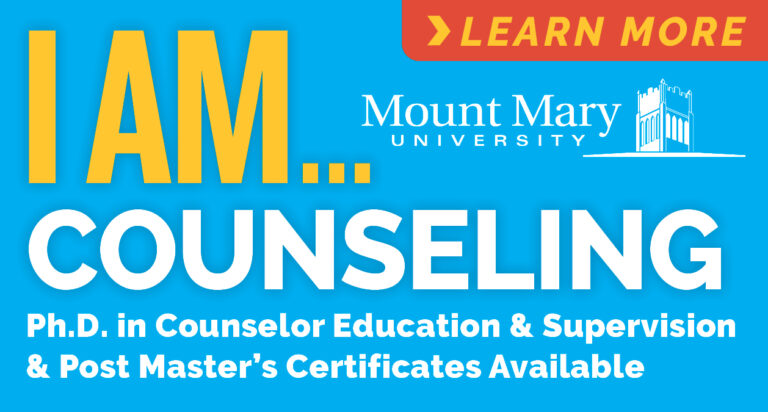January 2019

In This Issue:
A Message from the Department of Public Instruction
A Message from the WSCA Board
Feature Article: Seeing Students Through A Trauma Informed Lens
Trauma Resource: NCTSN
WSCA Conference
Legislative Update – Afternoon on the Hill
National School Counseling Week
WI Technical College Survey
ASCA National Model Helpful Tips
Counselink
WSCA Volunteers Needed
2019-20 Leadership Academy
A Message from the Department of Public Institution
Bits and Pieces as We Gaze Ahead
Gregg Curtis, PhD; School Counseling Consultant
As we roll out of 2018 and into 2019, let’s look ahead at a few bits and pieces that may affect how school counselors will continue to play a vital role in the development of Wisconsin students:
- Changes are afoot!
- As was announced December 27, Carolyn Stanford Taylor has been appointed as our new State Superintendent. Carolyn has been a member of the DPI family since 2001 and has most recently served in the role of Assistant State Superintendent and leader of the Division of Learning Support (DLS). My team, Student Services/Prevention and Wellness (SSPW), is a part of DLS; and I can attest to Carolyn’s vision, passion, and commitment to public education. I have been at the agency for almost 7 years now, and Carolyn’s support for our work has only increased over that time. She recognizes the importance of school counselors and comprehensive school counseling programs to student development. I am confident she will carry us further toward our goal of “Every Child a Graduate; College and Career Ready.”
- A new ACP/Dual Enrollment Consultant is expected to join us in early 2019; with them comes a refocus on the implementation of Academic and Career Planning services. We are now into Year 2 of mandated implementation and Year 4 of our evaluation partnership with Wisconsin Center for Education Research’s Wisconsin Evaluation Collaborative (WEC). As our new consultant gets up to speed on the fast-moving-trains that are “Start College Now” and the “Early College Credit Program,” DPI’s ACP team, our CESA ACP partners, and local school districts will continue to provide professional development in implementation strategies and planning for the Xello transition. Results from WEC’s research will be used to help decide on specific areas of implementation need, as well as target the trainings in the use of Xello.
- Another addition coming in early 2019 will be a new Alternative Education Consultant. This person will fill the role previously held by long-time consultant Beth Lewis and, most recently, Nancy Molfenter. Our new consultant will be your touchpoint for all things alternative education, from GED to GED-O2 to HSED to Challenge Academy and beyond. Our new consultant will be dedicated to helping educators, parents/guardians, and students to finding a path toward educational success that is right for them.
- Finally, we will have a new School Psychology Consultant on the SSPW team. Elizabeth Cook, who many of you know through her work with School Mental Health and/or Trauma Sensitive Schools, has announced that she will be leaving the agency in January. As of this date, the position has not yet been posted; but interested parties may want to watchhttps://dpi.wi.gov/human-resources/jobs for the information.
- School Climate/Safety, Mental Health, ACP, and SEL will continue to be hot topics for counselors!
- With a new administration equally, if not more, dedicated to both the safety and success of all students, one can predict these areas will continue to be supported at the state level. As most of you know, the proposed DPI biennial budget contains financial requests to support schools in providing more/better mental health services for students, increasing pupil services staff, and keeping kids safe. In addition, ESSA Title IV funding provides support access to a well-rounded education and improving school conditions for learning to ensure safe and healthy students. Counselors are in a position to lead districts in the development of a systematic, comprehensive, and intentional integration of these four key areas. Areas that can come together in a way that is not “just another thing” for all educators; rather a) a way to teach students, not content, b) to promote whole child development, not leave kids behind by testing them ‘til the cows come home, and c) reinvigorate an educational workforce that is already stretched way too thin.
- Ongoing professional development through WSCA’s conference, fall summit, and summer academy, as well as DPI (and their WISH Center partners), will allow counselors to increase their knowledge and skills in many areas. Trainings to support counselors in multiple transitions (from the WCSCM to the ASCA Model, from WCSCM student standards to ASCA Mindsets & Behaviors, from Career Cruising to Xello, etc.), in trauma sensitive schools, in Youth Mental Health First Aid, in school-based career development through ACP and SEL, and in the use of data, will be occurring throughout the year.
It seems like I say this every year, but it is an exciting time to be a professional school counselor. Recognition of our contributions to students’ success is increasing; as is the importance of seizing leadership opportunities to help shape our school’s climate and culture. Outgoing State Superintendent Tony Evers used to say public educators are working on the side of angels. As someone who knows the work you have done, do today, and will do tomorrow with and for students, I wholeheartedly agree.
Best for a healthy, safe, and positive 2019!!
A Message from the WSCA Board of Directors
WSCA Board of Directors Election Slate
Olin Morrison, WSCA Board Nominations & Elections Committee Chair
Hello WSCA, I’m excited to write to you today about our Wisconsin School Counselor Association Board of Directors election slate. In February we will be asking our owners (WSCA Members) to vote to approve the slate of candidates that I am presenting to you today. Before I get to this years candidates though, I wanted to share a key component of WSCA’s Policy Governance structure that influences the selection of the slate of candidates. First, it is important to understand that the board of directors functions as owner representatives and servant leaders. The distinction between directors as occupational experts vs. servant leaders/owner representatives is especially important when it comes to elections. Slate candidates are not evaluated based on their school counseling expertise, but rather their ability to serve in the role of a director. Understanding what qualities make an effective member of the WSCA Board of Directors is probably most easily accomplished by reviewing our “governing style” as defined in our Board Policy Manual:
Governing Style: The Board will govern lawfully with an emphasis on:Outward vision rather than internal preoccupation.Encouragement of diversity in viewpoints.
Strategic leadership more than administrative detail.
Clear distinction of Board and Chief Executive roles.
Collective rather than individual decisions.
Future rather than past or present.
Proactivity rather than reactivity.
This year, the Nominations and Elections sub-committee of the Board was faced with a true challenge. In my time serving on this sub-committee I have seen a steady increase in qualified applicants for the WSCA Board. In the past four years we have gone from struggling to find enough candidates to fill our election slate to having seven highly qualified candidates to fill three open positions. The process of determining the best three candidates out of the seven was not easy. The Nominations and Elections sub-committee would like to thank all of this years applicants for making our job difficult. It was exactly the type of challenge you would hope your association be faced with, and a great sign of the health of WSCA. This year, the WSCA Board of Directors is excited to present the following slate of candidates to our owners for final approval:
Donna Okray is a practicing school counselor at Lincoln Center for the Arts, part of the Milwaukee Public Schools. A graduate of UW-Milwaukee School Counseling Program, she is in her 30th year of practice as a school counselor. As a member of the inaugural cohort of the WSCA Leadership Development Academy, Donna has spent the last year learning about leadership and effective governance. Donna loves the professional development and leadership opportunities provided by WSCA and is excited at the opportunity to serve on the Board of Directors. In her own words, “My experience serving on various committees and the completion of an Educational Leadership degree demonstrates my desire to continually learn, work collaboratively for the good of the whole organization, and serve as an advocate-leader for the school counseling profession.” Donna’s references spoke highly of her ability to understand diverse opinions and navigate conflicts.
Megan Williams is a practicing school counselor at Rufus King International High School, part of the Milwaukee Public Schools. A graduate of the Mount Mary School Counseling Program, Megan is in her second year as a practicing school counselor. Megan takes a proactive and future focused approach to her work and will bring these same qualities to the WSCA Board of Directors. In the words of one of her references, “Megan has a way of sitting back and listening, formulating her response, and then strategically sharing. She is not reactive but reflective.” Megan’s ability to listen, reflect, and challenge is an essential series of skills for a highly functioning director. Megan loves that WSCA provides a space to come together and collaborate, support each other, and celebrate the work that we do.
Steve Schneider is a practicing school counselor at Sheboygan South High School. A graduate of UW-Milwaukee School Counseling Program, he is in his 23rd year of practice as a school counselor. Steve brings a wealth of knowledge in the area effective association governance and has served as Policy Governance Coach for the WSCA Board of Directors for the past four years. Over the last 14 years, Steve has served in a number of different roles for WSCA and ASCA, including WSCA President, ASCA Secondary Vice-President, and WSCA Conference Co-Chair. He brings a future focused view to the positions in which he serves. In the words of one of his references, “Steve sees the big picture and advocates for what will be needed for the profession 10 to 15 years down the road. He does not get stuck in the details of the day-to-day operation.”
All three of our slate candidates will be wearing a “candidate” ribbon at the annual conference. Please take the time to introduce yourself and ask any questions you might have of them. Then go vote!
Seeing Students Through A Trauma Informed Lens
By: Kelly O’Connell
Posing the thought, “I wonder what you have been through,” is the backbone to using a trauma informed lens when working with our students in a school setting. It is easy to focus on the behaviors we see from a student and to forget about all the things we do not know and cannot see, much like the underside of an iceberg. The traumatic experiences that our students face impact their beliefs about themselves, the adults around them, and the world itself. In addition to this change in beliefs, children exposed to chronic trauma can have a decreased ability to regulate their emotions and to control their impulses and behaviors (1). When we consider the significant impact this trauma has on our students, we can start to look at their behaviors in a whole different way.
So what does this mean for us as school counselors? First, it is our job to educate our staff about the impact trauma has on our students. Recently, a team of our staff conducted an inservice for our high school staff where they had to analyze a case scenario and were provided both the visible school behaviors of the student as well as his background story that we often do not know. They then analyzed how these experiences have likely impacted his beliefs, leading to the visible coping behaviors, and then brainstormed different interventions or ways to reach out to the student.
In addition to trying to gain more background information, it can also be helpful to remember that chronological age and developmental age of a student do not always match. We expect a 16 year old to act very differently from an 8 year old, but, in many cases, ongoing trauma prevents our students from learning developmental skills. As counselors, we can view the behavior in a different way by considering what the developmental age the behavior seems to match, and then treating the behavior as if the student were that age in an appropriate way.
Collaborating with administration is also imperative when responding to the behaviors of students who may have experienced trauma. Often times, typical consequences, such as detention and suspension, only solidify a student’s beliefs about the world around them and thus reinforce the negative behavior we are actually trying to prevent. If we can get down to the root cause of the behavior, we may be able to come up with a more creative response that actually impacts and changes the behavior. For example, when working with a student who continually misses full days of school, we found out that she is often helping her younger siblings get up and ready in the morning. Rather than come to school late 30 minutes late, she would skip all day because she didn’t want to walk into class late. In response, we switched her schedule around to provide a study hall period first hour and provided her with a granola bar on days that she arrived late so that she could have breakfast. Since making that change, not only has she not missed a full day of school, but the number of days she arrives late have decreased by more than half!
It can be hard to keep trauma in the forefront of our minds, but everyday I challenge myself to look at at least one student in a different way. When we start to do this ourselves, and then teach the other professionals around us to do the same, we can have a positive impact on the overall culture and climate of our schools and students.
Resources:
Evers, T. (n.d.). Using Positive Behavioral Interventions & Supports (PBIS) to Help Schools Become More Trauma-Sensitive. Retrieved April 4, 2017, from https://dpi.wi.gov/sites/default/files/imce/sspw/pdf/mhtraumausingpbis.pdfBurns, D., Fureman, C., & Eslick, S. (2017, April 17, March 20, February 20). Trauma Responsive Schools. Lecture presented at Trauma Responsive Schools in Delavan-Darien-High School, Delavan.
We are less than one month away from the 2019 WSCA Annual Conference! Come and see firsthand what the Power of Hope can do for School Counseling Professionals February 5-7, 2019 in Madison WI. There is still time if you have not yet registered. Online registration can be completed HERE.
New this year!
FREE parking at Alliant Energy Center will be provided so you won’t have to worry about bringing cash for the parking lot. Convenient shuttle service runs from the parking lot and area hotels directly to the Monona Terrace. Just park, hop on the shuttle and enjoy the view of Lake Monona as you gear up for the conference experience. View parking and shuttle info HERE.
Preconference Workshops
Preconference workshops offer a great way to expand your conference experience. New this year: there will be 16 half day workshops to maximize your time and learning. In addition, two free workshops will be provided (Afternoon On The Hill and the ACP panel). See the full listing of preconference workshops HERE
WSCA is excited to offer the “Black Girl Blues” workshop this year. A popular sectional last year, this year’s half day pre-con will be filled with “aha moments” that can be taken away and shared for the betterment of school culture. Best practices as they relate to teaching and mentoring African-American girls along with modeling activities to address this sensitive issue.
Another half-day workshop to note is the “Motivational Interviewing” session. Join us to learn about MI and how to apply the techniques within your school settings (K-Post-Secondary). In addition to receiving an overview of MI, you’ll practice introductory MI skills, including best practices for giving advice, listening with strategic reflection statements, and eliciting change talk to increase students’ motivation. The tools you will learn can be widely applied to help students and families make positive and lasting behavior changes in their lives.
Early Bird Sessions
More Early Bird Sessions added this year! Take advantage of an additional round of sectionals available on Wednesday morning starting at 7:15 a.m. See the full list of sectionals HERE.
Professional Headshots
Need to update your professional headshot for social media or your school website? Be sure to have your FREE headshot taken from WSCA’s professional photographer.
Don’t Delay, Make Your Plans to Attend the WSCA Conference Today!







